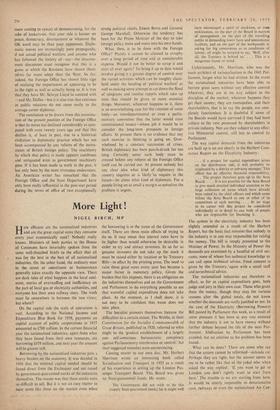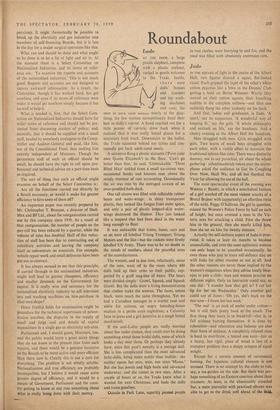More Light !
NIGEL BIRCH, MP How efficient are the nationalised industries and are the great capital sums they consume every year economically used? Nobody really knows. Ministers of both parties in the House of Commons have invariably spoken from the same well-thumbed briefs to the effect that all was for the best in the best of all nationalised industries. On the other hand, the ordinary man in the street or constituent or businessman generally takes exactly the opposite view. There are dark tales of what happens in the local coal- mine, stories of overstaffing and inefficiency on the part of local gas or electricity authorities, and everyone has their own railway story. The truth must lie somewhere in between the two views; but where?
On the capital side the scale of operations is vast. According to the National Income and Expenditure Blue Book for 1958, payments on capital account of public corporations in 1957 amounted to £788 million. In the current financial year the nationalised industries, apart from what they have found from their own resources, are borrowing £478 million, and next year the amount will be greater still.
Borrowing by the nationalised industries puts heavy burden on the economy. It was decided in 1956 that the external capital needed should be found direct from the Exchequer and not raised by government-guaranteed stocks of the industries themselves. The reason was that these stocks were so difficult to sell. But it is not an easy matter to raise sums like these on the market even when the borrowing is in the name of the Government itself. There are three main effects of trying to do so. It may mean that interest rates have to be higher than would otherwise be desirable in order to try and attract investors. In so far as genuine investors do not take up the stock it ,must be raised either by taxation or by Treasury Bills—in effect by the printing press. The need to raise these great sums every year has become a major factor in monetary policy. Given the burden that this imposes, there is an obligation on the industries themselves and on the Government and Parliament to do everything possible to see that wasteful capital expenditure does not take place. At the moment, as 1 shall show, it is not easy to be confident that waste does not take place.
The Socialist pioneers themselves foresaw the difficulties to a certain extent. The Webbs, in their Constitution for the Socialist Commonwealth of Great Britain, published in 1920, referred to what might be the 'gradual establishment of a largely non self-conscious bureaucratic conspiracy against Parliamentary interference or control,' but their suggested remedies were unconvincing.
Coming nearer to our own day, Mr. Herbert Morrison wrote an interesting book called Socialisation and Transport in 1933 as a result of his experience in setting up the London Pas- senger. Transport Board. This Board was given no State-guaranteed funds. He wrote: The Government did not wish to do this [supply State-guaranteed funds] for it might well have encouraged a spirit of slackness, or even recklessness, on the part of the Board in matters of management, on the part of the travelling public in demanding lower fares and uneconomic facilities, and on the part of the workpeople in asking for big concessions as to conditions of labour; all might be tempted to say, 'Well, after
all, the Treasury is behind us.' . . This is a dangerous frame of mind.
Unfortunately, Mr. Morrison, who was the main architect of nationalisation in the 1945 Par- liament, forgot what he had Written. In the event the nationalised industries have been able to borrow great sums without any effective control whatever; they are in no way subject to the discipline of the market; whatever happens they get their money; they are monopolies, and their shareholders, that is to say the people, are com- pletely functionless. It is doubtful if some of the Boards would have survived if they had been subject to the veto possessed by shareholders in private industry. Nor are they subject to any effec- tive Ministerial control, still less to control by Parliament.
The way capital demands from the industries are built up is set out clearly in the Herbert Com- mittee Report on the Electricity Industry : . . . if a project for capital expenditure arises on the distribution side, it will probably be originated by a district or sub-area manager. This officer has no effective financial responsibility. . . The project therefore goes up to the Area Board. . . . It is not possible for the Area Board to give much detailed individual attention to the large collection of items which have already been vetted by the chief officers and which come before the Area Board or one or other of its committees at each meeting. . . . At no stage in its career will this project be considered individually or in detail by any body of people who are responsible for financing it.
The system in the electricity industry has been slightly amended as a result of the Herbert Report, but the basic fact remains that nobody in the industry is in any way responsible for raking the money. The bill is simply presented to the Minister of Power. In the Ministry of Power the demands are examined by a handful of civil ser- vants, none of whom has technical knowledge or can call upon technical advice. Final consent is given by the Treasury,' again with a small staff and no technical advice.
The nationalised industries are therefore in effect, as far as capital expenditure goes, both judge and jury in their own case. Those who grant them the money, though they may for various reasons alter the global totals, do not know whether the demands are really justified or not. In the case of the Electricity (Borrowing Powers) Bill passed by Parliament this week, as a result of sonic pressure it has been at any rate ensured that the industry is not to have money without further debate beyond the life of the next Par- liament. Abdication by Parliament has been avoided, but no solution to the problem has been found.
What can be done'? There are some who say that the system cannot be reformed—delenda est. Perhaps they are right, but the answer seems to me to be rather like that of the yokel who when asked the way replied 'If you want to get to London you don't rightly want to start from here.' The trouble is we are starting from here. It would be utterly impossible to denationalise coal, railways or even the nationalised Air Cor- porations. It might theoretically be possible to break up the electricity and gas industries into members of self-financing Boards, but it is late in the day for a major surgical operation like this..
What can and should be done and what ought to be done is to let a bit of light and air in. At the moment there is a Select Committee on Nationalised Industries, and its terms of refer- ence are : `To examine the reports and accounts of the nationalised industries.' This is not much good. Reports and accounts are not designed to convey awkward information. As a result, the Committee, though it has worked hard, has got nowhere, and even if its terms of reference were wider it would get nowhere simply because it has no staff to help it.
What is needed is, first, that' the Select Corn- mittee on Nationalised Industries should have far wider terms of reference and should not be pre- vented from discussing matters of policy; and, secondly, that it should be supplied with a small staff, headed by somebody analogous to the Comp- troller and Auditor-General and paid, like him, out of the Consolidated Fund, thus making him entirely independent of Ministers. Though the permanent staff of such an official should be small, he should have the right to call upon pro- fessional and technical advice on a part-time basis as required.
The sort of thing that such an official might examine on behalf of the Select Committee is: Are all the functions carried out directly by a Board necessary, or would it make for greater efficiency to hive some of them off?
An important paper was recently prepared by Mr. Christopher T. Brunner, a director of Shell- Mex and BP Ltd., about the reorganisation carried out by this company since 1950. As a result of that reorganisation, the number of people on the pay-roll has been reduced by a quarter, while the volume of sales has doubled. Half of this reduc- tion of staff has been due to contracting out of subsidiary activities and leaving the company itself to concentrate on essentials. For example, vehicle repair work and small deliveries have been put out to contract.
It has always seemed to me that this principle, if carried through in the nationalised industries, might well lead to greater cheapness, efficiency and smaller demands on the Government for capital. Is it really wise and necessary for the nationalised electricity industry to sell television sets and washing machines 'on hire-purchase in their own shops?
Other fruitful fields for examination might be procedure for the technical supervision of power- station erection, the disparity in the supply of small and large 'coal and details of capital expenditure in a single gas or electricity sub-area.
Parliament and, I should guess, Ministers, too, and the public would learn a great many things they do not know at the present time from such reports, and there would be a genuine incentive to the Boards to be more active and more efficient than there now is. Clearly this is not a cure for everything. The problem is not wholly soluble. Nationalisation and true efficiency, are probably incompatible, but I believe it would cause some greater degree of efficiency, and it would be a means of Goverment, Parliament and the coun- try getting to know at any rate something about what is really being done with their money.



































 Previous page
Previous page